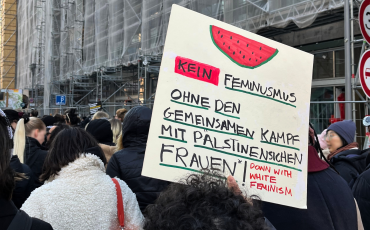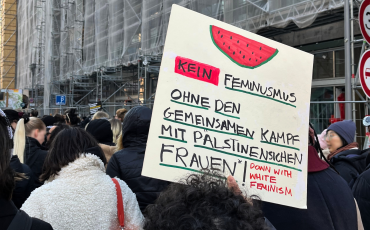Israel's war in Gaza is reminiscent of the darkest chapters of European colonialism. The author provides an Israeli perspective on the latest offensive “Gideon's Chariots” and calls for decolonization. An analysis of inner-Israeli dissent.
In the aftermath of the October 7th massacre, Israel launched a military campaign of unprecedented scope. Internally dubbed “Gideon’s Chariots”, the name signals a mythic framing of overwhelming force, echoing the logic of colonial conquest. The offensive is more than just a symbolic name: it is a theological-political re-framing of un-humane warfare that combines massive aerial bombardment, ground invasion, targeted assassinations, and the use of advanced AI systems to select targets—often with devastating consequences for civilians. The name evokes biblical imagery of divine vengeance and reflects the attempt to cloak excessive violence in a mantle of historic righteousness.
Yet behind the grand rhetoric lies a cynical political calculation: for Prime Minister Netanyahu, the war has become a lifeline. Facing deep domestic opposition for breaking the hostage deal and thereby leaving the remaining hostages to die—while no empathy is shown to Palestinian casualties—he is also subject to multiple corruption trials. Amidst the collapse of public trust, Netanyahu is using the war not only to silence dissent but to reframe himself as Israel’s indispensable wartime leader seeking a “total victory”. He deliberately chooses to ignore the sentiments of the majority of the Israeli people who want a cease-fire deal to retrieve the hostages. By inflaming nationalist sentiments and rejecting any political solution to the conflict, he prolongs the violence—not to defend Israeli security, but to preserve his grip on power. “Gideon’s Chariots” is not merely a military operation, it is a political survival strategy, veiled in myth, paid for in the blood and starvation of innocent Palestinian people. And the number of casualties in Gaza is rising every day.
First calls for sanctions against Israel
The core idea behind the current offensive is deceptively simple: to force Hamas into surrendering its fighters and leadership, pushing it into exile entirely, and freeing all the hostages, dead or alive. But it is not Hamas that is paying the price—it is the Palestinian civil society. Gaza’s entire infrastructure has been decimated: hospitals, universities, schools, and public services have been reduced to rubble. There is no safe space left for civilians to move or resettle to.
What else can the people of Gaza endure, after more than 55,000 Palestinians have been killed and hundreds of thousands wounded? Keeping in mind that the toll may still rise, as many remain buried under collapsed buildings, their deaths yet uncounted. This is not just a military campaign; it is a catastrophic humanitarian crisis. And yet, for a long time, the world remained silent in the face of this devastation.
While the US and China are still hesitant to speak up and stop this massacre in Gaza, most recently the UK, France, and Canada have warned Israel of sanctions. On May 29th, hundreds of lawyers called for UK sanctions on Israel over the Gaza war. Even though the German Chancellor Merz criticized the continuation of the Gaza war on May 27th, he not only ignores Germany’s role in this catastrophe, but decided on June 4th to continue arming Israel.
The Impact of Colonial Durabilities on the Question of Palestine
The “Gideon’s Chariots” campaign marks the peak of Israel’s colonial era. To understand why, we must situate the current war within the arc of modern colonialism.
Israel was established in 1948, just as European colonial rule in Africa and Asia was beginning to collapse after centuries of exploitation, massacres, and the theft of indigenous land. The UK– however reluctantly—began retreating from its League of Nations mandate and Israel was founded on a parallel act of displacement: the Nakba or the expulsion of 750,000 Palestinians and the appropriation of their homes, lands, and belongings, formalized by Israeli laws like the Absentees' Property Law. In 1967, with the occupation of the West Bank and the Gaza Strip, Israel became a full-fledged colonial power.
The 1999 Oslo Accords once seemed to offer a possible exit from this path. But since October 7th, Israel has plunged headlong into a war that, in its methods and rhetoric, mirrors some of the darkest chapters of European colonial violence. Massive bombardment of civilian areas, starvation as a weapon of war, and AI-based targeting systems that ignore civilian casualties—all contribute to what leading Israeli generals themselves have begun to describe as potential war crimes.
Why compare this to European colonialism? Because what we see today are not anomalies, but patterns. Britain in India, France in Algeria, Belgium in the Congo, and Germany in Namibia—these were not exceptions, but systems built on domination, dehumanization, and the myth of a civilizing mission. These former colonial powers justified their violence by portraying their subjects as inferior, dangerous, or incapable of self-rule—much as Israeli officials do today when speaking of Palestinians. Netanyahu said more than once that he is continuing the war on Gaza to hold back barbarism and protect Western civilization.
Decolonization and its Limits
In 1857, Britain brutally crushed the Indian Rebellion, killing over 100,000 people and destroying entire cities. France’s counter-insurgency in Algeria resulted in the deaths of thousands through starvation, bombardment, and scorched-earth tactics. Germany's genocide of the Herero and Nama and Belgium's atrocities in the Congo are other infamous examples of colonial violence. And while the US abolished slavery in the 19th century, it never dismantled the racial order of white supremacy.
The path to decolonization has always been bloody—empires rarely willingly surrender their privileges. But eventually they collapse when the moral, political, and economic costs become unbearable for both rulers and ruled. Israel today operates as a colonial state that clings to colonial power structures. And now, with Gideon’s Chariots, we are not seeing the beginning but instead the last chapter of that colonial model.
But What of Israeli Society Itself?
In the months leading up to October 7th, Israel saw one of the largest protest movements in its history, with hundreds of thousands demonstrating against the far-right government’s judicial overhaul and anti-democratic agenda. These protests—while often disconnected from the occupation—signaled a growing discontent within Jewish Israeli society. Will this dissent re-emerge as the full horror of the Gaza war becomes clearer? Or will the trauma of October 7th and the surge of nationalist fervor drown it out?
Israeli opposition was already eliminated long before October 7th, the values of the left were certainly lost after the massacre. Leftist parties did call for a cease-fire over the Gaza war but ignored the need for a decolonization of Palestine. Apart from the Palestinian-Israeli parties, few political voices were heard against the destruction of the civil society in the Gaza Strip. One of these voices was Yair Golan. The leader of the Democratic party dared to accuse the Israeli army of killing Palestinian babies as a hobby. He also spoke about the threat of a boycott that could be imposed which would make Israel a pariah state and the destructive way of expelling the Palestinian population. For his criticism, he faced a massive, bipartisan backlash. Even opposition leaders Yair Lapid and Benny Gantz condemned him and stood behind the Israeli Defense Forces. Subject to public and political pressure, Golan went back on his word and withdrew some of his accusations. This explains why there is no real opposition in Israeli politics.
How long can Israeli society bear the weight of permanent occupation, deepening moral erosion, and increasing international isolation?
Another Path to Peace
There is another, more sustainable path to peace without inciting ever more violence. This path is set out in the January 2025 report “The Present Moment: Alternatives for a Peace-Seeking Israeli Policy” by the Forum for Civil Thinking at the Van Leer Jerusalem Institute:
“Since the outbreak of the war, the Israeli government has chosen daily the path of domination over the Palestinians—a path that involves widespread war crimes—while the opposition seeks a return to ‘conflict management’. We argue that only a historic reconciliation can give the State of Israel and all inhabitants of the land a chance for a prosperous and secure future in the region.”
This future–post-colonial, democratic, and just—is not yet lost. But time is running out.
This article was written bevor the killings of Palestinians waiting near distribution centers in the Gaza Strip and bevor the Israeli attacks on Iran.





















